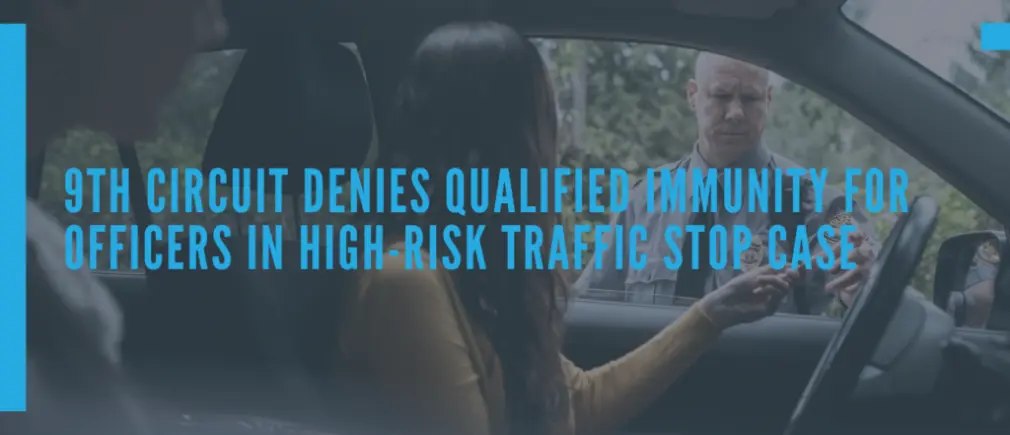9th Circuit Denies Qualified Immunity for Officers in High-Risk Traffic Stop Case

Hasmik Chinaryan was driving home with her teenage daughter and a friend after a family event when a police officer mistakenly believed her vehicle was stolen due to a series of errors, including incorrect license plates issued by the DMV. Despite driving lawfully for over ten minutes while being followed by a police car, the LAPD conducted a “high-risk” felony stop, involving about a dozen officers and a helicopter. The officers ordered Chinaryan and her passengers out of the vehicle at gunpoint, handcuffed them, and detained them on the street.
Chinaryan and her passengers sued the officers, the LAPD, and the City of Los Angeles for illegal seizures, excessive force, and improper training. While the district court initially ruled in favor of the officers, an appeals court reversed the decision, finding that the officers were not entitled to qualified immunity and remanded the case for a new trial on these claims.
The incident began when a black Chevrolet Suburban limousine was stolen, and the LAPD received a signal from the vehicle’s LoJack device. Officers in the area spotted Chinaryan’s similar-looking vehicle and mistakenly believed it to be the stolen car, especially after a mix-up with the license plate information. Despite no evidence of criminal activity, the officers pursued Chinaryan’s vehicle and conducted the stop, leading to a traumatic experience for Chinaryan and her passengers.
After being handcuffed, Chinaryan, her daughter, and their friend Manukyan remained detained while officers checked the Vehicle Identification Number (VIN) on their Suburban. Officers found that the VIN matched a 2018 Suburban registered to Levon Chinaryan, with only a minor discrepancy in the license plate number. Realizing the vehicle was not stolen and suspecting a DMV error, Officer Gonzalez informed the other officers. Despite some skepticism and further checks by the officers, all VINs matched, confirming the car was not stolen. The officers then removed the handcuffs and released the group after 24 minutes, advising them to contact the DMV for new plates.
The LAPD typically performs three types of vehicle stops: traffic enforcement, tactical investigatory, and high-risk stops. The officers’ actions during this incident—pointing guns, ordering the occupants out of the vehicle, and making them lie prone on the ground—were consistent with a high-risk stop, which involves greater use of force.
Chinaryan, her daughter, and Manukyan sued the officers, the City of Los Angeles, and the LAPD under civil rights laws, arguing that their Fourth Amendment rights were violated due to the use of excessive force without probable cause. The district court initially granted partial summary judgment for the officers, granting them qualified immunity because their conduct was not clearly established as a violation of rights. The jury later found in favor of the City and LAPD on related claims, and the court denied further motions by the plaintiffs for a new trial.
Qualified immunity protects officers from liability unless it is shown they violated a clearly established right. In this case, the court evaluated whether the level of force used by the officers was reasonable under the circumstances. While the crime of vehicle theft is considered severe, the plaintiffs posed no immediate threat, did not resist, and complied fully with the officers. Thus, the use of such intrusive tactics could be deemed excessive. The officers’ reasonable suspicion of a stolen vehicle, by itself, was insufficient to justify the level of force used, raising questions about whether their actions were protected by qualified immunity.
In this case, the court discusses when a right is considered “clearly established” for the purposes of determining if an officer’s actions violated constitutional protections, particularly in excessive force situations.
The court references a prior case, Green v. City & County of San Francisco, where officers mistakenly used high-risk tactics against Denise Green after a license plate error. Despite her compliance and the lack of a real threat, the officers treated her as if she was dangerous. The court found that the circumstances didn’t justify such extreme measures, and the officers’ actions were excessive.
In the current case, the defendants tried to argue that their actions were different from the Green case, but the court found that their reasoning was flawed. They did not have enough specific information to justify their high-risk tactics, and some of their concerns, like tinted windows, didn’t hold up. The court ruled that these tactics were unreasonable under the circumstances, rejecting the officers’ claim to qualified immunity.
The plaintiffs further argued that the district court was wrong to grant summary judgment in favor of the officers on their Bane Act claims. The Bane Act is similar to a §1983 claim, but it also requires proof that the officer had a specific intent to violate someone’s constitutional rights. The officer doesn’t need to know their actions are unlawful, but acting with “reckless disregard” for those rights can meet the intent requirement.
The district court had concluded that the officers’ behavior didn’t show specific intent to violate rights. However, this kind of determination is typically something for a jury to decide. There is evidence that the officers may have acted with reckless disregard, such as their routine use of high-risk stops on “cold-plated” vehicles, believing that such vehicles indicate danger or that the occupants might be armed.
The officers’ decision to carry out a high-risk stop, handcuff the plaintiffs, and force Chinaryan to the ground could show a lack of discretion and indifference to the plaintiffs’ rights. Additionally, even though the officers corrected their mistake once they discovered a DMV error, the time it took to release the plaintiffs could be seen as further disregard for their rights.
Based on this evidence, the court found that it was wrong for the district court to dismiss the Bane Act claims without letting a jury weigh in.
Think you have a case that involves an unlawful traffic stop? Contact us today for your free case consultation.


